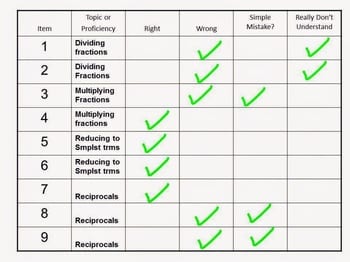Learner-Centered Tip of the Week: Deadlines and Redos
CompetencyWorks Blog
 This post originally appeared on Courtney Belolan’s website on September 28, 2015. Belolan is the instructional coach for RSU2 in Maine.
This post originally appeared on Courtney Belolan’s website on September 28, 2015. Belolan is the instructional coach for RSU2 in Maine.
One of the goals of learner-centered proficiency based education is to create authentic, real-life experiences for our students. Traditionally, the way school has been structured does not really mimic the experience people have outside of school. Do you categorize tasks into subject specific chunks? When is that last time you did just “math?” Have you ever said to yourself, or someone else, something like “Hold on, I’m doing science right now. That writing will have to wait until later.” I doubt it. How strange would that be!?
Or how about other real-life competencies? What happens when you are planning a group presentation, and one member doesn’t do their part? The presentations stinks, or is clearly lopsided. Perhaps the group members get annoyed with one another, and the slacker never gets invited to be a part of that kind of opportunity again. Maybe your supervisor expresses disappointment, and now you feel extra pressure at work. What about if you are late paying a bill? Maybe now you have to pay more. Depending on who you owe the money to, it can be a real hassle to correct the late payment. On the whole, however, we always have a second opportunity or a chance to fix the problem in real life. Even if we mess up royally and end up in prison, there is typically a way to work towards fixing the issue and getting back on track. What generally motivates us to do our best work, and get things paid on time is the hassle involved if we don’t.
If we want to create some of the real-world-esque scenarios around things like deadlines and retakes, we have to start thinking about setting up comparable hassles for our students. Giving students multiple opportunities to show what they know means giving second chances, maybe even third chances, but not without some work on their end. Here are two ways to build the hassle in so that students begin to learn that doing it well, and on time, on the first chance is worth the effort:
1. Require students to do an error analysis before resubmitting work, a project, or an assessment. In an error analysis, students need to identify what they got wrong, why they got it wrong, and then do whatever it takes to show they can do it. Here is an example of an error analysis for a math assessment:
2. Be honest with them about their performance and give them a second opportunity later on, not right away. This works well with more complex tasks, like presentations or other projects that take a significant amount of time. Support students to keep track of what went well, and what went wrong in their process. At the start of the next project, have kids take that feedback out and set some goals about how to go about things differently this time. Over the course of a semester, or a year, students will have wonderful evidence of their growth in these abilities, and future projects will be stronger.
3. Make the redo something different. Do make sure the assessment is as the same reasoning level as the initial task, otherwise it is an unfair assessment. Changing up the task requires students to continue to think, rather than just regurgitate. Mixing up the question order is a start, and not quite what I mean. Ask a different essay question. Give a task in a different output mode (visual representation rather than an essay). Have them hold a discussion with you on the spot.School can absolutely mimic the real life hassles we face when we don’t do out best the first time. We just have to think a little differently. Will there be times when a student decides to just deal with the consequences of late work or redos anyway? Sure. Sometimes we all do.
See also:
- Engagement Templates: 6 Ways to Structure Learning Experiences
- Shifting the Culture in Learner-Centered Environments
- Creating a Classroom Parking Lot
Courtney Belolan works at RSU 2 in Maine where she supports K-12 teachers with performance-based, individualized learning. Courtney works closely with teams and teachers as a coach, and with the school and district leadership teams as an instructional strategist. Courtney has worked as a 6-12 literacy and instructional coach, a middle level ELA teacher, an environmental educator, and a digital literacy coach. Her core beliefs include the idea that the best education is one centered on student passions and rooted in interdisciplinary applications, and that enjoying learning is just as important as the learning itself.
